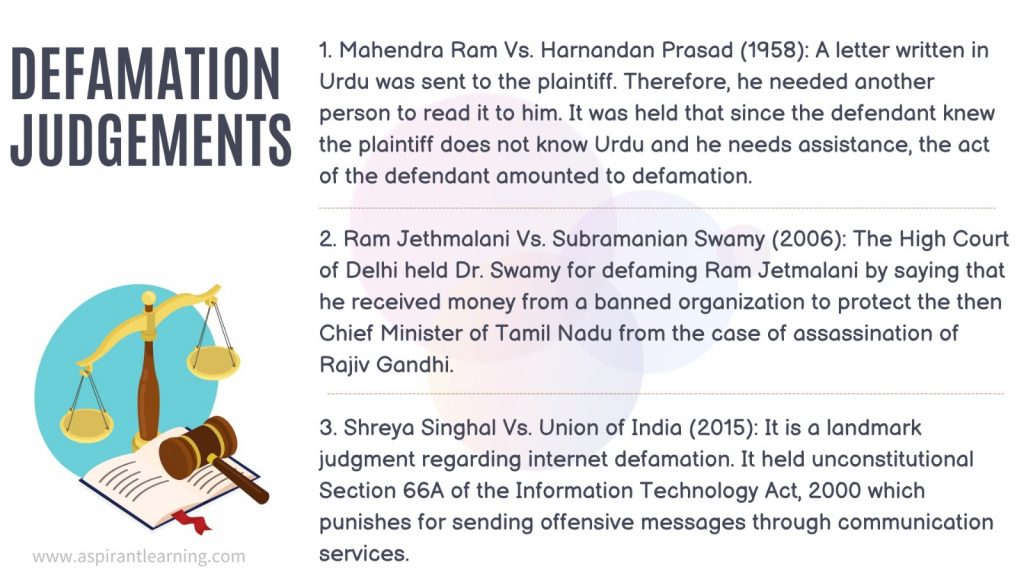News Highlights:
Recently, a sessions court in Surat granted bail to former Congress president Rahul Gandhi after admitting his appeal challenging the conviction and sentencing in a defamation case.
Key Takeaway:
- The defamation laws violate Fundamental Rights guaranteed under Article 19 of the constitution.
- Earlier, the Supreme Court ruled that the criminal provisions of defamation are constitutionally valid and do not conflict with the right to free speech.
Defamation in India:
- About
- Defamation is the act of communicating false statements about a person that injure that person’s reputation when observed through the eyes of an ordinary man.
- Any false and unprivileged statement published or spoken deliberately, intentionally, or knowingly to damage someone’s reputation is defamation.
- A man’s reputation is treated as his property, and such damage is punishable by law. It could be written or verbal. Written defamation, printed or typed material or images is called libel, and spoken defamation is called slander.
- History:
- The history of defamation can be traced to Roman law and German law. Abusive chants were capital punishment in Romans.
- In early English and German law, insults were punished by cutting out the tongue.
- Defamation Law in India:
- The constitution of India concerning Fundamental Rights guarantees various freedoms to citizens under Article 19, with reasonable restrictions.
- Contempt of court, defamation, and incitement to the offence are not allowed under the right to freedom.
- Justifiably, freedom to express need not and should not obliterate the right to life with dignity and reputation, and recognition is a fundamental right for the affected party as well.
- Free Speech v/s Defamation laws:
- It is argued that defamation laws violate Fundamental Rights guaranteed under Article 19 of the Constitution.
- The Supreme Court has ruled that the criminal provisions of defamation are constitutionally valid and are not in conflict with the right to free speech.
- The SC has also held that it is valid to treat defamation as a public wrong and that criminal defamation is not a disproportionate restriction on free speech because the protection of reputation is a fundamental right as well as a human right.
- The Court relied on the judgments of other countries and reaffirmed the right to reputation as a part of the right to life under Article 21.
- Using the principle of ‘balancing of fundamental rights’, the court held that the right to freedom, speech, and expression could not be “allowed so much room that even the reputation of an individual constituent of Article 21 would have no entry into that area”.

Defamation and its Nature:
- Overview:
- Defamation, by nature, is both a civil and criminal offence.
- In civil law, defamation is punishable under the Law of Torts by punishing damages awarded to the aggrieved party.
- In Criminal law, Defamation is a bailable, non-cognizable offence and can be compounded.
- Civil Defamation:
- The Allegation or statement must be false and expressed without the affected person’s consent.
- Provision of claiming monetary compensation from the defendant for the defamation.
- The statements or the allegations levelled must pass the test of the presence of a substance, facts defamatory.
- The defamatory content is meant to damage the reputation of the affected party, causing them hatred, hostility or ridicule.
- Defamation and its nature are calculated from the eye of the common citizen and their understanding of the matter.
- Criminal Defamation:
- In matters of criminal defamation, imprisonment can be awarded, as per Indian Penal Code (IPC) section 500.
- Section 499 of the IPC elaborates on how defamation could be through words – spoken or intended to be read, through signs, and also through visible representations.
- Under a criminal suit, the intention of the allegation must involve criminality, i.e. to defame, with malicious intent.
- It must be established beyond reasonable doubt that the action was meant to lower, harming the reputation of the affected party.
Pic Courtesy: Freepik
Content Source: The Hindu



